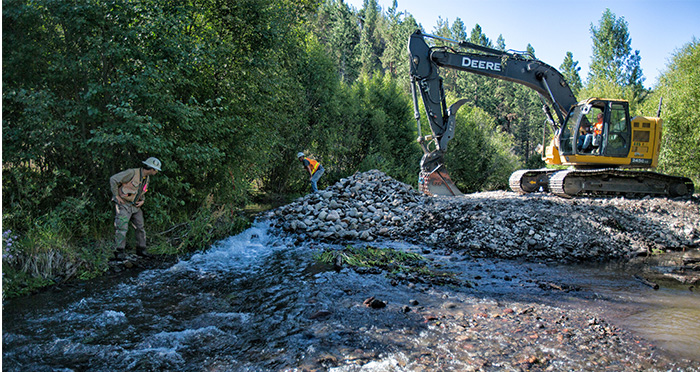(Photo above: Wychus Creek renovation)
At its September forum, City Club of Central Oregon announced the four finalists for the newly minted “Conversation of the Year” award.
Unlike most awards, which recognize individual achievement, the Conversation of the Year award celebrates the quality of the conversation itself and recognizes the community as the true winner. One or more individuals, for-profits, non-profits, or government entities will receive the circulating trophy for their participation in the conversation.
The selection committee is comprised of City Club’s past presidents and the award will go to the community conversation that best reflects City Club’s mission, which is “to build a conscious and civic minded community through dialog, education and research that results in responsible civic engagement.”
The trophy, designed and sponsored by Schmid Malone Buchanan, LLC, will be presented to the winner(s) at Civic Drinks – the annual City Club member mixer on October 24th at Awbrey Glen.
The four finalists, in no particular order, are as follows:
The UGB settlement known as the “Westside Transect”
Few words are as divisive in Central Oregon as “sprawl” and “density”. In this climate, the temptation might be to speak only with like-minded persons about these subjects. Fortunately, Central Oregon is blessed with leaders who seek to engage opposing viewpoints and solve complex problems. In this instance, developers Brooks Resources, Mike Tennant, Kirk Schueler, Ron White, and the Miller Family reached across traditional lines to engage in a conversation with Paul Dewey of Landwatch. They discussed, and ultimately agreed, to creative solutions to bring finality to the highly controversial decade-long process to expand Bend’s Urban Growth Boundary. Their leadership, collaboration, and cooperation with various committees and public officials brought long-sought finality to that process, defined a de facto permanent boundary to much of Bend’s west-side, and directed renewed investment into the infrastructure—and soul—of Bend’s urban core.
Wychus Creek Restoration
For nearly 100 years, 20 miles of Wychus Creek ran dry during irrigation season. Plans to pipe Wychus Creek and log its banks were halted in the 1980s by Sisters residents and the founders of what is now Landwatch of Central Oregon. A collaboration of irrigators and conservation interests has, since, restored stream flows, riverbanks, and habitat. Redband trout and runs of steelhead and salmon are being restored, and multi-party efforts acquire and preserve 930-acres for wildlife and the public has come to fruition. A preserve is now open to the public with 4 miles of restored creek and more than 7 miles of trails. Fish passage, stream restoration, dam removal, and creation of that reserve is the product of civil conversation, credible advocacy, and problem-solving by many, including Three Sisters Irrigation District, Central Oregon LandWatch, Upper Deschutes Watershed Council, Deschutes River Conservancy, Deschutes Land Trust, Oregon Watershed Enhancement Board, Warm Springs Tribes, PGE, and the Nature Conservancy.
Regional Transportation Funding Coalition
Traffic and gridlock seldom inspire civility. The region depends on infrastructure to serve its rapid growth, and gridlock threatens our health, safety, convenience, and economic interests. Thanks to the participants in this conversation, many private and public interests have united to seek state and federal funding to address local concerns for our region. Participants in this conversation include “Trip 97” (the City Managers of all Central Oregon cities), all of the region’s City Councils, all three county commissions, all chambers of commerce, the Bend Metropolitan Planning organization, Bend 2030’s Move Bend Coalition, and the Oregon Transportation Commission (of which Deschutes County Commissioner Tammy Baney has served as Chairperson).
Shift to Qualitative Emphasis for Tourism
Reasonable minds differ as to the relative costs and benefits of tourism in Central Oregon, as well as to the distribution of those costs and benefits within our society. Historically, we have engaged in a quantitative conversation that has pitted “pro tourism” advocates against “anti-tourism” interests. That conversation has recently shifted to a more qualitative approach. Participants now ask “what kind of tourism is financially and environmentally sustainable for our infrastructure, our neighborhoods, our natural environment, and our values?” Examples of this shift can be seen in Visit Bend’s “Visit Like a Local” campaign, in its efforts to seek broader input from the community, and in its initiative to attract low-impact or vehicle-free tourism. Bend’s recent commitment to fund the arts—or art tourism—with revenue from its transient room tax is the first of its kind in Oregon.
City Club of Central Oregon exists to be the top-of-mind hub for citizens and community leaders. We intentionally shape our community and influence public policy while preserving our uniquely warm and connected culture. We champion “passionately non-partisan” discussion between diverse perspectives.





